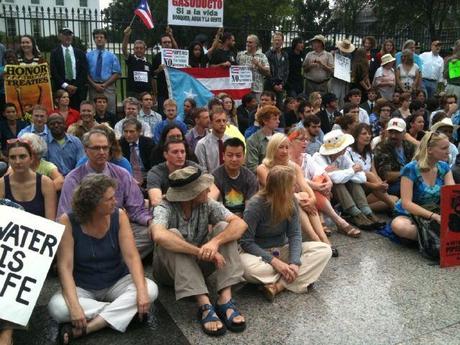
Demonstrators against Keystone XL surround the White House.
The general public often seems to have a sense of trepidation about activist movements. What are they seeking? Are they independent, or will they be co-opted? Are they naively hopeful, or do they have a chance to force true change? Will those in power even listen? In the past weeks, some of those doubts have been muted, or at least softened. In the face of intense grassroots pressure, the Keystone XL pipeline has been rejected and the congressional progress of SOPA and PIPA has ground to a halt.The two narratives have major differences. Keystone XL protests took place over months and involved hundreds of thousands of people on the streets and online. They were mobilized by environmental groups and concerned citizens who refused to be complacent about the construction of a new fossil fuel pipeline that would transport some of the dirtiest energy on the planet through environmentally sensitive areas of Nebraska. On the other side were the forces of big oil, the Canadian government, and concerned citizens who desired more jobs regardless of the collateral damage. Ultimately, the imposition of a more stringent timeline as part of the payroll tax cut extension forced Obama to deny the permit or face legal repercussions. It's a convenient position: he will receive praise from the environmentalists and have a decent defense of his decision to pipeline advocates.
The backlash against SOPA and PIPA has been in the public eye far more. They started out as bipartisan bills backed by the powerful music and film lobbies. The main issue: any websites could be censored or shut down for the suspicion of containing pirated content or copyright violations. In other words, user-generated content could precipitate the closure of Wikipedia, Facebook, Youtube, and hundreds of other frequently-used websites. When the details emerged, activists and internet businesses responded forcefully. Wikipedia shut down entirely, and Google posted a petition that garnered millions of signatures in a single day. Why was the response more robust than the backlash against Keystone? As an issue of civil liberties, the campaign against the bills proved unifying, while debates framed as environment vs. economy are inherently divisive. The bipartisan support became bipartisan opposition almost overnight, and the freedom of the internet was preserved.
However, both stories were examples of the strength of concentrated activism to influence public policy, definitive proof that common principles can be upheld via the democratic system even when power and money congregate on the opposing side. What victories will activism achieve in the remainder of this year? Let me know your thoughts in the comments.

